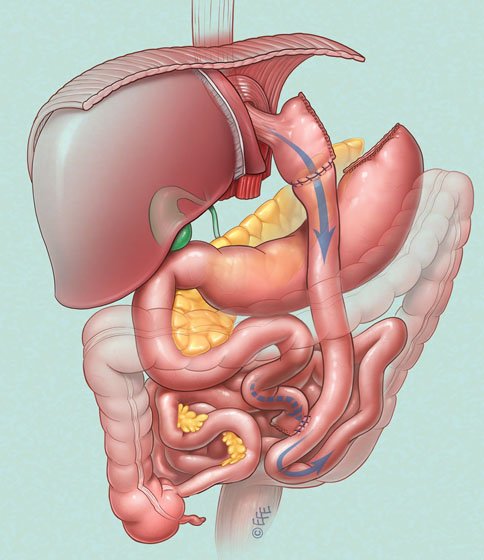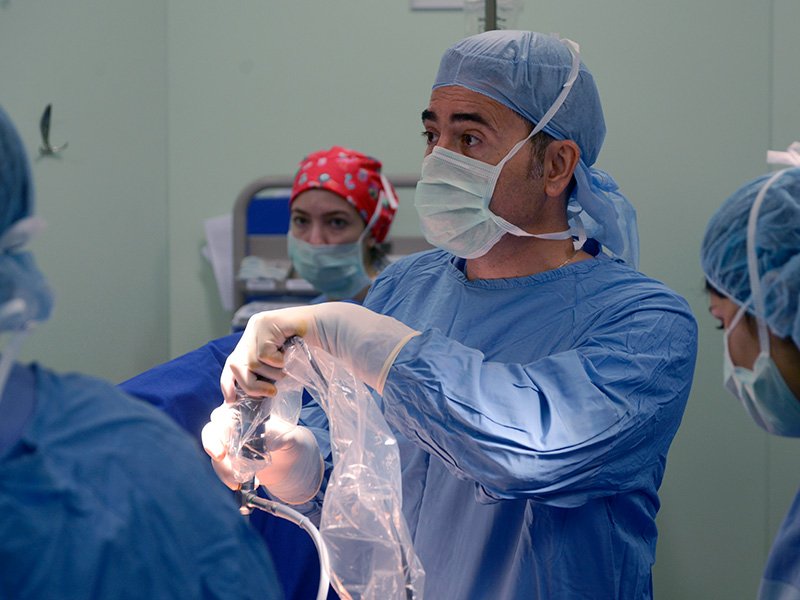Gastric Bypass
What Is Laparoscopic Gastric Bypass Surgery?
Over the last 30 years, gastric bypass surgery has been the most commonly performed type of bariatric surgery in the United States, where the largest number of bariatric surgery procedures is performed. In the course of time, the bypass technique has changed as well. Today, it is a very effective and safe procedure to reorganize the digestive system by means of bypass surgeries as long as the operations are done by experienced bariatric surgeons. For eligible candidates, the acquirements of the surgical procedure are many times more than its risks.

How is Gastric Bypass Surgery Performed?
Gastric bypass is a combined procedure having both volume-restrictive and absorption-reducing properties. The first stage of the surgery involves the separation of a small part (20-25 ml) from the upper part of the stomach by using staplers, in such a way as to form a new small stomach pouch. In this way, the feeling of satiety is made achievable with very small amount of foods. This volume is nearly equal to the volume between the quarter and half of a soup bowl. Eating constantly in small amounts, and achieving the feeling of satiety despite this leads to weight loss.
The second stage of the surgery involves the process called ‘bypass’ that means bridging. In other words, the remaining part of the stomach and a certain amount of small intestine are bypassed. This part continues to perform its duty of transferring enzymes that play a role in digestion, such as gastric acid, bile acid and pancreatic juice. The newly formed stomach pouch is anastomosed to a small intestine segment located about 150-200 cm on average (gastro-entero anastomosis). In other words, foods are ensured to directly reach advanced points of the small intestine, without passing through the rest of the stomach and 2 m segment of the small intestine. One of the effects of this procedure is that absorption does not occur in that 2 m segment of the small intestine, since it is does not get engaged in digestive fluids. In other words, some of the foods taken are discharged without absorption.
What provides the essential metabolic power of the surgery is a totally different mechanism. If we try to summarize, different hormonal substances are secreted from each area of the human digestive system. Certain hormones called ‘incretins’, secreted from the end of the small intestines, are the hormones having an effect parallel to the effect of insulin (that balances the blood sugar); and they strengthen insulin. Substances called ‘anorexigenic hormones’ that provide the sense of satiety and reduce appetite are also secreted from this region.
Since people in modern times take nourishment increasingly from refined foods, no undigested foods remain until foods reach advanced points of the small intestines. This is one of the strongest underlying causes of the epidemic of obesity and diabetes experienced in recent years. Through bypass-type surgical operations, the advanced levels of the small intestine and undigested foods get together, and thus, the hormonal mechanisms revive. This mechanism constitutes an additional power for the restriction of food intake, and a barrier against weight regain.
What will be Waiting for Me After Gastric Bypass Surgery?
Gastric bypass surgery is a very powerful weapon in your fight against obesity; however, it is not a miraculous treatment. Most patients lose 65-90% of their excess weight within the first postoperative year. Gastric bypass provides perfect results in the treatment of obesity-related comorbidities, as well. Among these, the primary ones are Type 2 diabetes, hypertension, sleep apnea, high cholesterol and acid reflux.
As in all other surgical procedures, weight loss may slow down and even weight regain may be experienced if patients do not follow our recommendations on healthy eating and regular exercise etc.
The absorption of some important nutrients decreases in parallel with the decrease in caloric absorption. The bypassed part of the small intestine is responsible for the absorption of calcium, folic acid, iron and B vitamins. After bypass surgery, you should avoid vitamin and mineral deficiencies and should receive your tailor-made treatment involving vitamin and mineral supplements, for being able to be protected against serious health problems. This is why follow-ups, laboratory tests and nutritional consultation after bariatric surgery are very important.
How is Gastric Bypass Surgery Performed?
We perform gastric bypass operations, like all other bariatric surgery procedures, with laparoscopic techniques; in other words, we perform the procedure by accessing the intended site through only 4 small (a few millimeters long) incisions, without opening your abdomen. The average time of surgery is 3 hours. Of course, this may vary depending on the anatomy and the story of any previously undergone surgery. The hospitalization period is 3 days.
Is an Intense Pain Felt After Gastric Bypass Surgery?
All surgical interventions cause some pain. However, at our center, gastric bypass surgery (like all other surgical procedures) is performed in such a way as to ensure you to experience the first postoperative day with maximum comfort and minimal pain, by numbing the trocar incision sites (the most painful areas) with of long-acting painkillers, and enabling you to use a patient-controlled analgesia infusion pump. From the second day, most of patients do not even want to have painkillers.
How are Follow-Ups Conducted After Gastric Bypass Surgery?
Your first follow-up control will be conducted within 7 to 10 days after gastric bypass surgery. In that control, your fluid consumption will be evaluated and the clues of early complications will be investigated. You controls will be done in the 1st-3rd-6th-12th-18th-24th postoperative months. In these controls, you will be asked to take a detailed laboratory examination revealing your metabolic condition from your liver enzymes to your vitamin-mineral levels. In these controls, our dietitian will also monitor whether you lose weight healthily and whether lose your muscle mass. If any specific deficiency is found during the tests, reinforcing treatments will be organized. For our patients living outside our city or abroad, it would be agreeable to have these tests performed and then send us their results, as long as they have no any other problem. You can establish one-to-one communication with our team via Skype.

